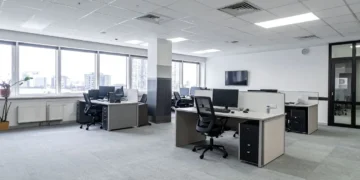- Hubble’s Tushar Agarwal shares why he believes the London market doesn’t need more rooftop spaces, but rather larger, more flexible spaces.
- Agarwal argues that space requirements in the UK capital have shifted over the course of the last 5 years.
- To help operators better plan out and fit out their spaces, Hubble is developing its own data infrastructure to pinpoint how operators can meet demand.
Currently 5% of the office market in London is flexible and on average, a new space opens in the capital every 5 days. Since 2009, London submarkets have seen their flexible space double or even triple, driven by operators taking larger buildings and expanding their floorplates.
By all accounts, the flexible workspace market in London is booming. But there’s always room for improvement. So what’s missing?
According to Tushar Agarwal, co-founder and CEO of flexible workspace marketplace, Hubble, the capital needs more flexible spaces that can cater to larger requirements.
“We’re now working with a lot of large businesses. When we launched 5 years ago, we were dealing with micro businesses looking for space for between 1 and 5 people,” says Agarwal. “Now we’re seeing more requirements for 100+ desks.
“It’s a real transformation. These firms weren’t looking before but they’re now more aware of what flexible space has to offer. But there’s a shortage of options of this size.”
While London overall has more supply and plenty of different options for medium-to-large businesses, Agarwal notes that the supply of larger spaces is trailing demand.
“The problem is that it takes a long time to find, negotiate, and build out a space. Previously the market was very speculative; there wasn’t enough data to back up decisions made by operators. So now we’re seeing an over-supply in hot desks and small spaces, but not enough supply for large flexible spaces for 100-150 people.”
To help balance the market, Hubble is developing its own data infrastructure to help London office providers identify gaps in the market, and pinpoint how they can meet demand by optimising their current spaces or building new ones.
This development is driven by a recent £4 million Series A funding round, led by JLL Spark Global Venture Fund, which has been used to more than double the team and hire more software engineers, analysts and customer advisors.
“30,000 people search Hubble every month, and that figure keeps rising. We have a lot of data available to help providers be more efficient, and make better and more informed decisions.”
After all, Hubble wins if the market wins, and it’s in their interest — and that of their backers — to help providers build the ‘perfect’ space.
But that elusive perfect space isn’t just about design, or tech, or views from the window. Agarwal notes that it’s about introducing greater flexibility into buildings to allow for rapid transition in sizing.
“There’s an opportunity to be more flexible in terms of sizing. For instance, having a wall that can be removed to change a 20-desk office into a 40-desk workspace.
“The worlds are increasingly blurring between the once segmented markets of traditional leases, managed offices, and flexible space. We’re seeing more demand for larger space requirements and providers that have the flexibility to accommodate these different requirements will benefit, as the appetite for flexible space continues.”
As for workspace amenities, Agarwal notes that while certain amenities must come as standard, others come down to personal preference.
“Amenities are very subjective. For companies that need to entertain clients, a bar or rooftop event space is important, and they may be willing to trade off on other requirements. Other clients don’t care as much — for them it’s all about the location.
“There’s now a minimum standard in buildings, they must have excellent meeting rooms, breakout spaces, and coffee and kitchen facilities. But the standard is changing. 5 years ago, nobody asked us about childcare in the office. Now it’s much more prevalent.
“It shows that if you can solve these problems in the workplace, it changes the dynamic of how people work.”
And this dynamic is changing at incredible speed.
“When we launched in 2014, there was huge scepticism about flexible space. We were told it was too niche. Now just 5 years later, every large real estate broker has publicly announced in their own research that the flexible market is huge, and it’s going to make up one third of commercial real estate by 2030.
“They have also put their money where their mouth is. JLL has invested in Hubble, CBRE launched Hana, and so on.
“Now it’s generally accepted that this is the normal way that businesses, including corporates, handle their office space. It was a trend, now it’s becoming the norm.”



 Dr. Gleb Tsipursky – The Office Whisperer
Dr. Gleb Tsipursky – The Office Whisperer Nirit Cohen – WorkFutures
Nirit Cohen – WorkFutures Angela Howard – Culture Expert
Angela Howard – Culture Expert Drew Jones – Design & Innovation
Drew Jones – Design & Innovation Jonathan Price – CRE & Flex Expert
Jonathan Price – CRE & Flex Expert












